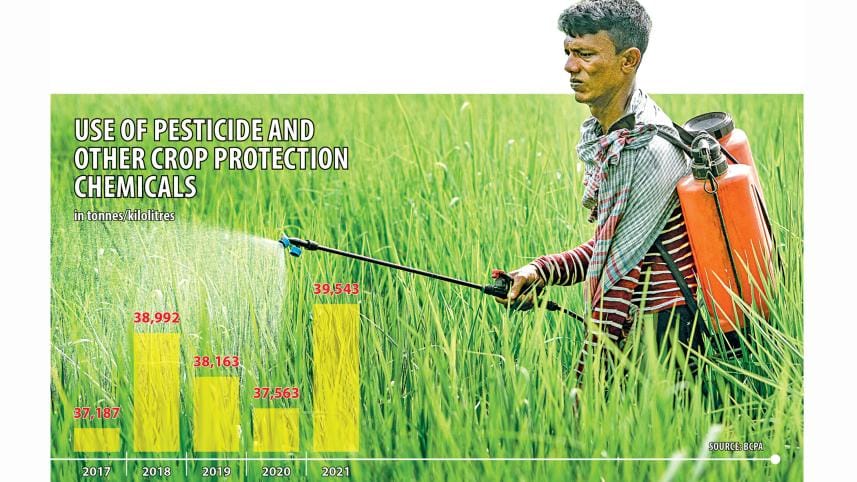Dollar crisis hurts pesticide imports, may hit crop output

Crop protection chemical sellers in Bangladesh are facing difficulty in opening letters of credit amid banks' lack of interest owing to the crunch of the US dollar.
This raises concerns about a shortage of pesticides and other similar inputs that could affect the productivity of crops such as boro rice.
The worry comes at a time when farmers are growing the boro paddy, the biggest rice crop in Bangladesh, generating 55 per cent of the total rice production of around 3.79 crore tonnes estimated in the last fiscal year.
A dry season rice crop, boro consumes roughly 60 per cent of pesticides and other crop protection chemicals while other crops, including potatoes and vegetables, consume the rest, industry operators say.
So, ensuring the availability of pesticides at the farm level is vital to ensuring that farmers get the input on time for the use in their fields.
"Banks are not opening LCs easily. They are taking time and asking for placing low-value LCs," said Syed Asfakul Abedin, executive director of Auto Crop Care Ltd.
The shortage might drive up pesticide prices further, which have already shot up between 15 per cent and 20 per cent in the last one year
Zahidul Islam, managing director of Bayer Crop Science, one of the leading multinational companies in the pesticide business segment in Bangladesh, echoed the sentiment.
"We are facing difficulties in opening LCs due to the foreign exchange crisis," he said.
Amid higher import costs than the total receipts from exports and remittances, Bangladesh's foreign currency reserve has been under pressure for the past one year, as disruptions caused by the dragging coronavirus pandemic and the Russia-Ukraine war have sent the prices of commodities higher globally.
The reserves stood at $32.63 billion at the end of last week, down from $45.35 billion a year ago, according to Bangladesh Bank data.

Abedin said already there is a shortage of some crop protection items. "If the situation does not improve, the deficit may widen."
And the shortage might drive up pesticide prices further, which have already shot up between 15 per cent and 20 per cent in the last one year for the depreciation of the taka against the US dollar, the supply disruption, and the higher sea freight and transport costs for the hike in fuel prices.
Operators say the cost of production at the farmer's level has increased since August after the government hiked the prices of fuel and fertiliser. Under this circumstance, farmers might reduce the use of pesticides.
"I have not seen such a price spike in the last 10 years," Abedin said.
"As prices have gone up, many farmers might reduce the use of pesticides that they usually apply."
M Sayeduzzaman, chairman of the Bangladesh Crop Protection Association (BCPA), said the recent drop in the foreign currency reserve poses a notable setback to the opening of LCs in a timely manner.
The BCPA earlier urged the agriculture and finance ministries and the Bangladesh Bank to take necessary measures to address the issue of pesticide import.
Consequently, the agriculture ministry requested the central bank to initiate steps to open LCs for pesticide import on a priority basis in a bid to secure crop production in the near term.
"We see there is an improvement. But it is not enough to ensure an adequate import and supply to farmers," Sayeduzzaman said.
"If we can't import required pesticides it may create a serious problem in food production," he warned.
In Bangladesh, an average 35 per cent of the potential crop yield is lost due to agricultural pests, a huge loss for a country like Bangladesh.
"And that loss would double if we fail to control crop pests in a timely manner," said Sayeduzzaman.
The BCPA is yet to finalise pesticide usage data for 2022.
The association said farmers who meet their demand through imports used more than 39,500 tonnes/kilo-litres of crop protection chemicals in 2021, up 5 per cent from a year ago. Fungicide usage was the highest, followed by insecticides.
Bangladesh imports pesticides and other crop protection chemicals mostly from China, India, Germany and the United States.
In 2021, farmers used 4,636 tonnes of granular insecticides, 2,240 tonnes of powder, 6,345 tonnes of liquid insecticides, and 18,000 tonnes of fungicide to protect their crops.
"We are maintaining a very tight inventory of pesticides," said Sayeduzzaman.
He said the foreign currency required to import necessary pesticides a year is insignificant in comparison to that of other industries.
"We expect the government to issue a circular to all commercial banks immediately to allow the opening of LCs for pesticides on a priority basis in order to maintain their availability at the farm level."
Badal Chandra Biswas, director general of the Department of Agricultural Extension (DAE), said the agriculture ministry has talked with the central bank so that pesticide import does not hamper.
Farmers bagged 2 crore tonnes of boro rice in 2022 and the DAE targets to ensure production of 2.15 crore tonnes of the staple in the current fiscal year, which ends in June.
The government has set a rice production goal of 4.15 crore tonnes for 2022-23.




 For all latest news, follow The Daily Star's Google News channel.
For all latest news, follow The Daily Star's Google News channel.
Comments